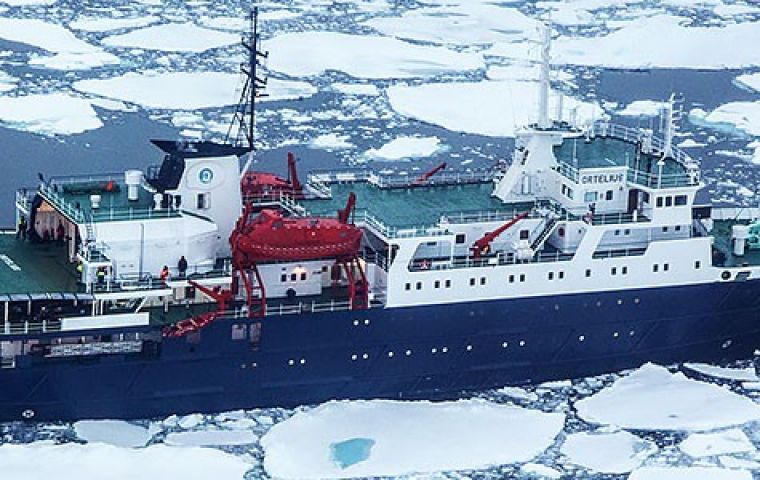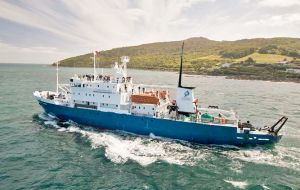MercoPress. South Atlantic News Agency
IAATO tests protocols in Antarctic Search and Rescue exercise with RCCNZ
 In the scenario MV Ortelius, operated by Oceanwide Expeditions, reported an engine room fire that caused a temporary loss of power and eight casualties
In the scenario MV Ortelius, operated by Oceanwide Expeditions, reported an engine room fire that caused a temporary loss of power and eight casualties  Heritage Expedition’s vessel, Spirit of Enderby, was among a number of resources tasked with going to Ortelius to assist.
Heritage Expedition’s vessel, Spirit of Enderby, was among a number of resources tasked with going to Ortelius to assist. The International Association of Antarctica Tour Operators (IAATO) and two member operators, Oceanwide Expeditions and Heritage Expeditions, took part in a live Search and Rescue (SAR) Exercise in collaboration with Maritime New Zealand’s Rescue Coordination Centre New Zealand (RCCNZ) on Feb. 12.
This was a table-top exercise with live components; the intent being to test existing protocols, contingency plans and lines of communication between the ship in distress, RCCNZ and IAATO. Potential assets within the search and rescue region that could be tasked with assisting, including other IAATO vessels, were also evaluated, according to a released statement.
IAATO Operations and Environmental Manager, Tudor Morgan said, “Collaboration is key to any search and rescue effort so this was a fantastic opportunity to test our communication procedures with RCCNZ and demonstrate our shared commitment to safety in the Southern Ocean.
”In the rare event of an incident occurring, IAATO’s role is to communicate effectively with member operators and the Maritime Rescue Coordination Centre involved. Live exercises like this one are valuable for training, fine tuning our protocols and strengthening important working relationships.”
Dave Wilson, responsible at RCCNZ for Antarctic SAR planning said “This was a challenging and realistic scenario, as each element was taken from real SAR operations coordinated within the Ross Sea region. While thorough risk assessment and prevention plans will reduce the likelihood of such events, situations can occur on board vessels that are beyond the crew’s ability to resolve without external SAR assistance. It is important for all organizations operating in the Antarctic to understand that this scenario could happen to any vessel, and in these cases it is critical that vessels nearby, as well as SAR authorities ashore, are rapidly alerted so they can assist in a coordinated SAR operation with minimum delay.”
“RCCNZ has a well-developed SAR Response Plan for the Antarctic, underpinned by the strong relationships established with the National Antarctic Programmes and the many government and non-government organizations that may be asked to assist in a SAR operation.”
In the scenario, the ship MV Ortelius, operated by Oceanwide Expeditions, reported an engine room fire that caused a temporary loss of power and eight casualties among the fire fighting crew, three of which required medical evacuation. Heritage Expedition’s vessel, Spirit of Enderby, was among a number of resources tasked with going to Ortelius to assist.
This was the third Search and Rescue Exercise to be conducted by IAATO and its members. It follows joint initiatives with the Maritime Rescue Coordination Centre (MRCC) Ushuaia, Argentina and MRCC Chile in 2014 and 2013 respectively.
IAATO is a member organization founded in 1991 to advocate, promote and practice safe and environmentally responsible private-sector travel to the Antarctic.
IAATO currently has 118 members.
IAATO Members work together to develop, adopt and implement operational standards that mitigate potential environmental impacts. Numerous guidelines have been adopted over the last 20 years that have proven to be successful methods in avoiding such impacts. These include but are not limited to: site specific guidelines, site selection criteria, passenger to staff ratios, limiting numbers of passengers ashore, boot washing guidelines and the prevention of the transmission of alien organisms, wilderness etiquette, garbage policy, ship scheduling and vessel communication procedures, emergency medical evacuation procedures, emergency contingency plans, reporting procedures, marine wildlife watching guidelines, station visitation policies and more.




Top Comments
Disclaimer & comment rulesCommenting for this story is now closed.
If you have a Facebook account, become a fan and comment on our Facebook Page!